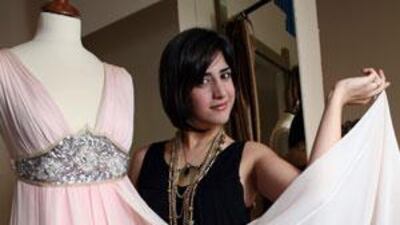When I was young, I really loved drawing. I had a sense of fashion in my own clothes - I like to dress up. I knew that I was interested in fashion mostly because I used to stitch clothes for my Barbies. My aunt is a tailor, and I knew people who practised tailoring and had a good sense of style and that's how they became designers. I didn't really understand that there was something called "fashion design". As a young kid, I used to watch her and saw how she took measurements and where she took them from. Being around her was a big help for me. I used to ask for permission to take these little pieces of fabric off the ground before she threw them away and I used to make them into Barbie clothes.
I made a dress for the Eid after Ramadan, when I was about 14. It was a turquoise dress with a V-neckline and a scarf under the collar. I tied the scarf into a bow and I stuck the ends of the bow with masking tape under the collar to maintain the shape because that's all I knew back then! When I went to university, my main aim was to do fashion design. Then, two months before graduating from the American University of Dubai I got a job at MBC and the fashion thing kind of went into a coma. After a few years, I decided to go back into fashion and branched out on my own. I started with an amateur fashion show so that I could have feedback - that was in 2006. Then, I opened my own shop in Sharjah and since then I have been taking it day by day.
Being in Dubai exposes you to a lot of cultures, but back in the day, all I knew about were people like Elie Saab and the big brands that I had heard about. I didn't understand much about simplicity or ready-to-wear. All I knew was bling-bling. So when I went to university, that was the mentality I was going in with and it took months, even years, until I really started understanding how it is with the international fashion world. I realised that I was more interested in ready-to-wear and dresses that we can wear on a daily basis. On most days, I have to be in the same outfit from day to evening, so I always think about that. But in every collection I do I end up with a few evening-wear pieces.
One of my big fashion inspirations is my husband. One day he called me up - we hardly knew each other - and he said: "I'd like to meet you and talk about your business. Let's see what you are doing and maybe I will help you out." So I invited him to my first fashion show. He is extremely classic and he wears the best quality. He focuses on things that will stay around and that you will like years after making it. That really opened my eyes to not following the fashion trends, but rather to taking ideas and applying them for a classic look.
My favourite dress is a white printed cotton dress made with big flared sleeves and an A-line cut that is not fitted. I am Arab and naturally we have darker skin tones, so white is the best way to pop the contrast. In summer, I was a newlywed and I was wearing white most of the time. In fact, I made an entire fashion collection called White. My next colour, which was also in the collection, was a light peach that I am wearing a lot these days. The next tone I will get into is deep, rich watermelon. I am going to paint the walls of my shop with it and I'm looking for shoes in that colour but I can't find anything.
My wardrobe is in an entire room with a section for the shoes and bags and the walls are dedicated to clothes. One is for the more elegant evening wear and another one is for jackets, skirts and trousers and the last one is for daily wear like shirts and jeans. I organise everything by colour because that's exactly how I think. What got me here is being very friendly to people. I never ever treat people like they are less than me and a client often, almost always, becomes a friend. I don't know how to work with someone without getting into their lives. Living in Dubai, it's mostly about making contacts. If you are formal and cold with people, how will you ever do that?

